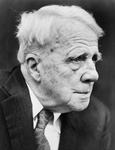Biography

Robert Frost was born in San Francisco on March 26, 1874. He moved to New England at the age of eleven and became interested in reading and writing poetry during his high school years in Lawrence, Massachusetts. He was enrolled at Dartmouth College in 1892, and later at Harvard, though he never earned a formal degree.
Frost drifted through a string of occupations after leaving school, working as a teacher, cobbler, and editor of the Lawrence Sentinel. His first professional poem, "My Butterfly," was published on November 8, 1894, in the New York newspaper The Independent.
In 1895, Frost married Elinor Miriam White, who became a major inspiration in his poetry until her death in 1938. The couple moved to England in 1912, after their New Hampshire farm failed, and it was abroad that Frost met and was influenced by such contemporary British poets as Edward Thomas, Rupert Brooke, and Robert Graves. While in England, Frost also established a friendship with the poet Ezra Pound, who helped to promote and publish his work.
By the time Frost returned to the United States in 1915, he had published two full-length collections, A Boy's Will and North of Boston, and his reputation was established. By the nineteen-twenties, he was the most celebrated poet in America, and with each new book—including New Hampshire (1923), A Further Range (1936), Steeple Bush (1947), and In the Clearing (1962)—his fame and honors (including four Pulitzer Prizes) increased.
Though his work is principally associated with the life and landscape of New England, and though he was a poet of traditional verse forms and metrics who remained steadfastly aloof from the poetic movements and fashions of his time, Frost is anything but a merely regional or minor poet. The author of searching and often dark meditations on universal themes, he is a quintessentially modern poet in his adherence to language as it is actually spoken, in the psychological complexity of his portraits, and in the degree to which his work is infused with layers of ambiguity and irony.
In a 1970 review of The Poetry of Robert Frost, the poet Daniel Hoffman describes Frost's early work as "the Puritan ethic turned astonishingly lyrical and enabled to say out loud the sources of its own delight in the world," and comments on Frost's career as The American Bard: "He became a national celebrity, our nearly official Poet Laureate, and a great performer in the tradition of that earlier master of the literary vernacular, Mark Twain."
About Frost, President John F. Kennedy said, "He has bequeathed his nation a body of imperishable verse from which Americans will forever gain joy and understanding."
Robert Frost lived and taught for many years in Massachusetts and Vermont, and died in Boston on January 29, 1963.
* North of Boston (David Nutt, 1914; Holt, 1914)
o "Mending Wall"
* Mountain Interval (Holt, 1916)
o "The Road Not Taken"
* Selected Poems (Holt, 1923)
Includes poems from first three volumes and the poem The Runaway
* New Hampshire (Holt, 1923; Grant Richards, 1924)
* Several Short Poems (Holt, 1924)[1]
* Selected Poems (Holt, 1928)
* West-Running Brook (Holt, 1928? 1929)
* The Lovely Shall Be Choosers (Random House, 1929)
* Collected Poems of Robert Frost (Holt, 1930; Longmans, Green, 1930)
* The Lone Striker (Knopf, 1933)
* Selected Poems: Third Edition (Holt, 1934)
* Three Poems (Baker Library, Dartmouth College, 1935)
* The Gold Hesperidee (Bibliophile Press, 1935)
* From Snow to Snow (Holt, 1936)
* A Further Range (Holt, 1936; Cape, 1937)
* Collected Poems of Robert Frost (Holt, 1939; Longmans, Green, 1939)
* A Witness Tree (Holt, 1942; Cape, 1943)
* Come In, and Other Poems (1943)
* Steeple Bush (Holt, 1947)
* Complete Poems of Robert Frost, 1949 (Holt, 1949; Cape, 1951)
* Hard Not To Be King (House of Books, 1951)
* Aforesaid (Holt, 1954)
* A Remembrance Collection of New Poems (Holt, 1959)
* You Come Too (Holt, 1959; Bodley Head, 1964)
* In the Clearing (Holt Rinehart & Winston, 1962)
* The Poetry of Robert Frost (New York, 1969)
* A Further Range (published as Further Range in 1926, as New Poems by Holt, 1936; Cape, 1937)
* Nothing Gold Can Stay
* What Fifty Said
* Fire And Ice
* A Drumlin Woodchuck
Last updated July 24, 2011



